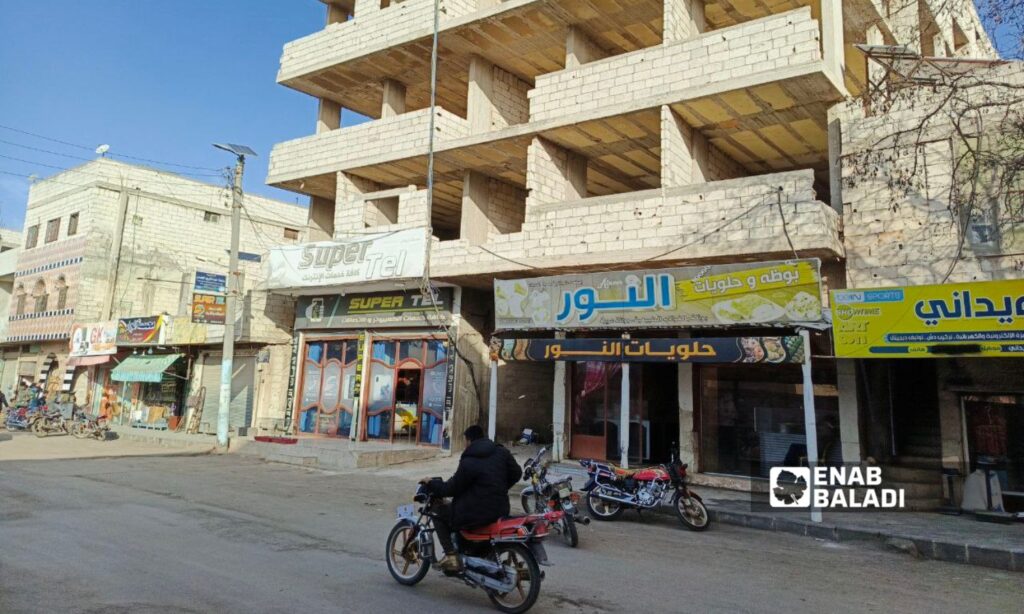Daraa – Halim Muhammad
The Daraa governorate in southern Syria is witnessing a rise in rental prices, especially following increased demand for homes due to the return of some displaced persons from Lebanon, Jordan, northern Syria, and Turkey to their cities and towns.
According to Enab Baladi‘s correspondent in Daraa, rents have risen between 30% and 40%, with no apartment renting for less than 750,000 Syrian pounds (about $50), and prices can reach six million pounds (about $400) depending on the location, size, and features of the house.
Eviction or rent increase
After his house in Daraa al-Balad was destroyed by the previous regime’s airstrikes, Hussein Zatima has rented a home in the Shamal al-Khat neighborhood for nearly ten years.
He told Enab Baladi that the landlord requested an increase in the monthly rent from 800,000 Syrian pounds to 1,200,000 Syrian pounds (about $80).
Currently retired from a government job with a salary of 300,000 Syrian pounds (about $20), Zatima noted that there is no law regulating landlords, and the greed and the residents’ need for housing compel them to exploit the current situation.
Following the July 2018 settlement, Zatima has been unable to return to his home due to the impossibility of repairs, and neither government agencies of the previous regime nor international organizations have intervened, forcing him to continue renting in the city of Daraa.
If the landlord continues to pressure him for a rent increase, he said he would put up a tent in his destroyed home until he can afford to restore it.
In front of his destroyed home in the Daraa camp, Khaled al-Soudi mentioned that he currently faces two options: either increase the rent as requested by the landlord, who has raised it from 800,000 to one million Syrian pounds, or return to live in his destroyed home, as he cannot afford any increase since he works as a government employee in Daraa.
Regarding finding an alternative, al-Soudi said that rents in the countryside are lower, but the distance from work incurs transportation costs, which have also risen recently.
As for Haytham Aliyan, a resident of the Daraa camp, he lives in an unfinished room in the Daraa camp at a monthly rent of 600,000 Syrian pounds (about $40), but his landlord has recently asked him to increase the rent to 800,000 pounds.
Aliyan works in construction for a wage that does not exceed 75,000 Syrian pounds a day, and he fears becoming homeless if the landlord continues to pressure him, forcing him to return to his destroyed home until he can repair it.
Increased demand for housing
Mohammed al-Masalmah, a real estate office owner in Daraa, informed Enab Baladi that the return of displaced persons has led some to demand that tenants, even those who lived for free, vacate their homes, prompting them to look for alternatives and revitalizing the real estate market in the province.
He added that leases are agreements between the tenant and the landlord that are not subject to specific pricing regulations, but rather are based on mutual consent according to the price set by the landlord.
The commercial mindset governs the balance of profit and loss since the price of a home can reach 700 million Syrian pounds (about $50,000), making a monthly rent of less than one million pounds unacceptable to the landlord, as it is seen as a losing project in light of the costs associated with the home, according to al-Masalmah.
Areas such as Daraa al-Balad, the Daraa camp, and the southern part of the city of Daraa witnessed clashes between the previous regime forces and opposition forces, resulting in significant destruction.
International organizations or institutions of the previous regime have not worked on fully restoring destroyed homes, focusing instead on partial repairs of doors, windows, and bathrooms.
The rise in construction material prices has contributed to the slowdown in construction activity, and the construction market has witnessed stagnation over the past years.

